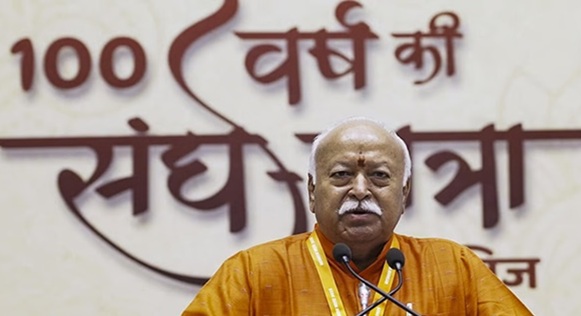
- Full Name: Rashtriya Swayamsevak Sangh (RSS)
- Abbreviation: RSS
- Founded: 27 September 1925
- Founder: Dr. Keshav Baliram Hedgewar (Nagpur, Maharashtra)
- Headquarters: Nagpur, Maharashtra
- Nature: A socio-cultural and nationalist organization
Objectives
- To preserve and promote India’s culture and traditions.
- To develop national unity and discipline in society.
- To instill patriotism, spirit of service, and social awareness among citizens.
- To strengthen the nation by organizing the Hindu society.
Structure and Functioning
- Shakha (Branch):
- The basic unit of RSS.
- Held in open grounds in the morning or evening.
- Activities include physical exercises, yoga, games, songs, and discussions on patriotism.
- Swayamsevak (Volunteer):
- Members associated with RSS.
- Participate in social service, education, disaster management, and cultural activities.
- Uniform:
- Earlier: Khaki shorts, white shirt, and black cap.
- Now: Khaki pants, white shirt, and black cap.
Associated Organizations (Sangh Parivar)
RSS has established various organizations for working in different fields, collectively called the Sangh Parivar. Key organizations include:
- Bharatiya Janata Party (BJP): Political organization
- Vishwa Hindu Parishad (VHP): Religious and cultural organization
- Akhil Bharatiya Vidyarthi Parishad (ABVP): Student organization
- Bharatiya Mazdoor Sangh (BMS): Labor organization
- Rashtriya Seva Bharati: Social service organization
- Seva Bharati, Vanvasi Kalyan Ashram, Sanskar Bharati, etc.
Chiefs of RSS
- Dr. Keshav Baliram Hedgewar (1925–1940)
- Madhav Sadashiv Golwalkar (1940–1973)
- Madhav Rao Deoras (1973–1994)
- Prof. Rajendra Singh (1994–2000)
- K.S. Sudarshan (2000–2009)
- Mohan Bhagwat (2009–present)
Contributions to Society
- Indirect contribution to the freedom struggle (some volunteers participated in movements).
- Disaster management: Relief work during earthquakes, floods, and pandemics.
- Education: Establishment of schools, Gurukuls, and educational institutions.
- Social harmony: Campaigns against casteism, village-level service initiatives.
- Promotion of patriotism: Cultural programs, training, and emphasis on discipline.
Controversies and Criticisms
- Political connections: Alleged guidance to BJP by RSS.
- Religious nationalism: Critics view it as a carrier of “Hindu nationalism.”
- Bans:
- 1948: After Mahatma Gandhi’s assassination
- 1975: During Emergency
- 1992: After Babri Masjid demolition
(All bans were later lifted.)
Current Status
- RSS is considered India’s largest voluntary organization.
- Number of Shakhas: Over 60,000 (in India and abroad).
- Its influence continues to grow socially and politically.
|
Question: When and where was the Rashtriya Swayamsevak Sangh (RSS) founded ?
(a) 1920, Mumbai
(b) 1925, Nagpur
(c) 1930, Delhi
(d) 1947, Kolkata
|

 Contact Us
Contact Us  New Batch : 9555124124/ 7428085757
New Batch : 9555124124/ 7428085757  Tech Support : 9555124124/ 7428085757
Tech Support : 9555124124/ 7428085757







